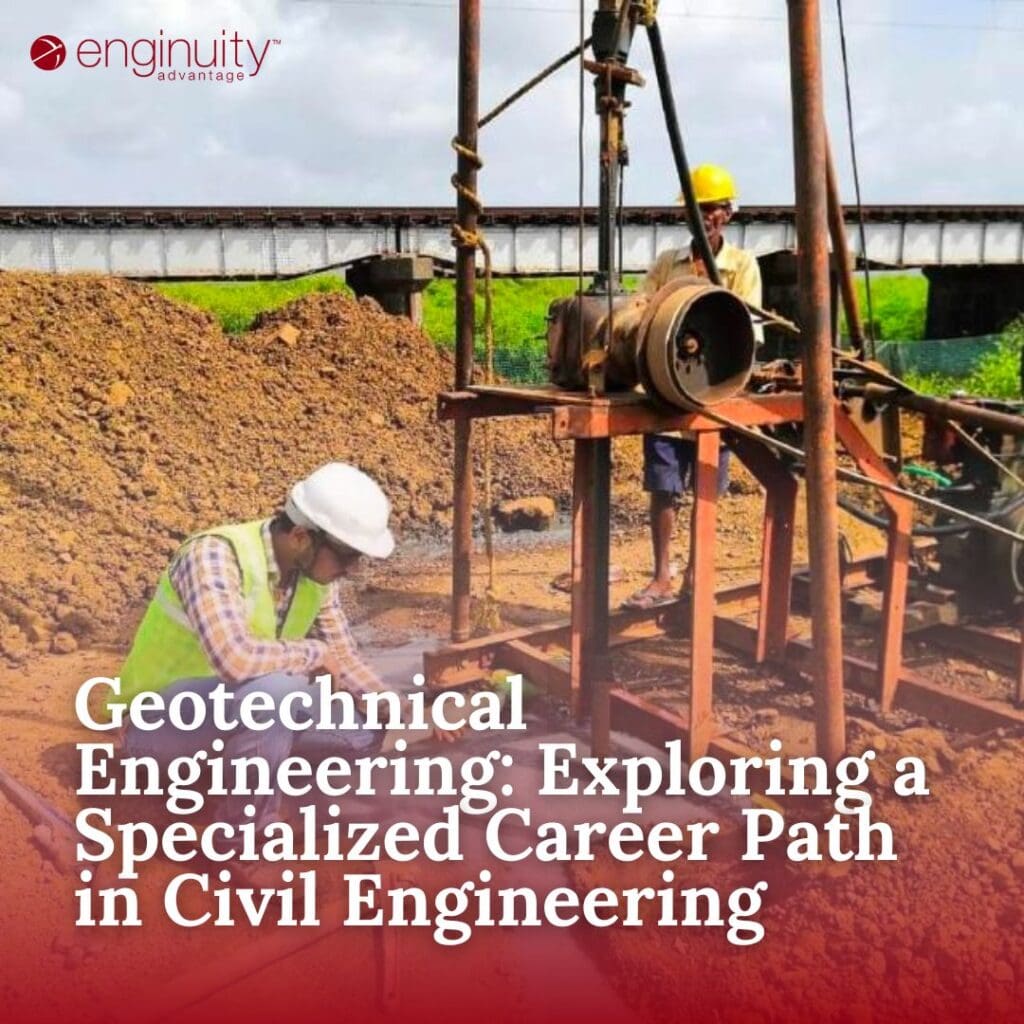Geotechnical Engineering: Exploring a Specialized Career Path in Civil Engineering

If you’re drawn to the world of civil engineering but are seeking a niche that combines the principles of engineering with the wonders of Earth sciences, geotechnical engineering might be your calling. This specialized field delves deep into the study of Earth’s materials and their interaction with engineered structures. Let’s embark on a journey to explore the intricacies of geotechnical engineering.
What is Geotechnical Engineering?
Geotechnical engineering is a specialized career path of civil engineering that focuses on analyzing the behavior and properties of soil and rock. These analyses are crucial when designing foundations for structures, embankments, tunnels, and other constructions that interact with or are supported by the Earth’s surface.
- Environmental Considerations: With the growing emphasis on sustainability, geotechnical engineers also play a role in environmental conservation. They help design structures that minimize disruption to the natural environment and recommend construction practices that reduce environmental impact.
- Innovative Solutions: As urban spaces become more congested and the challenges of building in diverse terrains increase, geotechnical engineers are at the forefront of devising innovative solutions. Whether it’s building tunnels beneath bustling cities or ensuring the stability of structures on hilly terrains, their expertise is invaluable
- Foundation of Structures: Every structure, be it a skyscraper, a bridge, or a dam, rests on the Earth. Geotechnical engineers ensure that these structures have a solid foundation by analyzing the ground beneath. They determine how deep a foundation should be, what materials to use, and how to design it to withstand various forces.
- Interaction with Natural Elements: The Earth is dynamic. It shifts, expands, contracts, and sometimes even shakes. Geotechnical engineers study these movements and predict how they might affect existing and future structures. This is especially crucial in earthquake-prone areas or regions susceptible to landslides.
- Soil Mechanics: Soil isn’t just a uniform material. It varies in composition, moisture content, compactness, and many other factors. Geotechnical engineers study soil mechanics to understand how different soils respond to changes in their environment and to various loads placed upon them.
A Day in the Life of a Geotechnical Engineer
Being a geotechnical engineer is both challenging and rewarding, offering a mix of fieldwork, analysis, and collaboration.
- Site Investigations: Before any construction project kicks off, geotechnical engineers are on the ground, assessing the soil, rock, and groundwater conditions. Their findings are crucial in guiding the project’s design and execution.
- Laboratory Testing: Soil and rock samples are often taken to labs for detailed testing. This helps engineers understand their properties and behaviors under various conditions.
- Design and Recommendations: Based on their analyses, geotechnical engineers provide vital input on the design of foundations, retaining walls, and other structural elements. Their expertise can make the difference between a project’s success and failure.
Education and Career Pathways
To step into the world of geotechnical engineering, a bachelor’s degree in civil engineering is typically required, with a focus or specialization in geotechnics. Many professionals further their knowledge with master’s or doctoral degrees. According to the U.S. Bureau of Labor Statistics, the median annual wage for civil engineers, which includes geotechnical engineers, was $89,940 in May 2022. The employment of civil engineers is projected to grow by 5% from 2022 to 2032, indicating a promising outlook for aspiring geotechnical engineers.
While the role of geotechnical engineers comes with its set of challenges, such as ensuring the safety of others and making high-stakes decisions, it also offers numerous rewards.
Geotechnical engineers often have the chance to travel, sometimes even internationally, applying their expertise directly in various settings. The profession provides ample opportunities to network, meet diverse individuals, and collaborate with a spectrum of professionals.
The Future of Geotechnical Engineering and Why It Matters
With urbanization on the rise and the increasing complexity of modern infrastructure projects, the expertise of geotechnical engineers will be in high demand. Their role in assessing and mitigating risks, especially in areas prone to earthquakes, landslides, and other natural hazards, will be invaluable.
Beyond the technical aspects, geotechnical engineering plays a crucial role in ensuring the safety and sustainability of our built environment. Their insights help prevent structural failures, protect lives, and ensure that our infrastructures stand the test of time.
Geotechnical engineering offers a unique blend of fieldwork, analysis, and design. For those intrigued by the Earth’s mysteries and eager to play a role in shaping our built environment, it’s a career path filled with opportunities and challenges. If you’re considering a career in geotechnical engineering or looking for exciting job opportunities in the field, we invite you to explore our job openings and be part of this dynamic pathway.
Unlock Dream Careers & Elite Talent: Just One Click Away!


